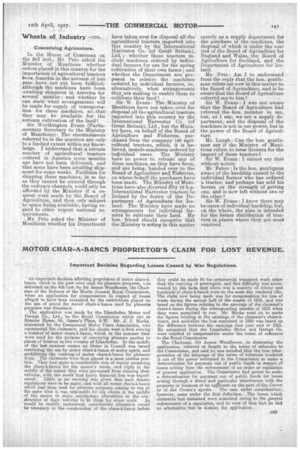MOTOR CHAR-A-RANCS PROPRIETOR'S CLAIM FOR LOST REVENUE.
Page 13

If you've noticed an error in this article please click here to report it so we can fix it.
Important Decision Regarding Losses Caused by War Regulations.
An important decision affecting proprietors of motor chars-bbeams, which in the past were used for pleasure purposes, use delivered on the 4th inst. by Sir James Woodhouse, the Chairman of the Defence of the Realm (Losses) Royal Commission, when an application for compensation in respect of losses alleged to have been sustained by the restrictions placed on the use of petrol for motor chars-Is-banes used for pleasure purposes was dismissed.
Tlae application was made by the Llandudno Motor and Garage Co., Ltd., to the Royal. Commission which sits at Spencer House, St. James's Place, S.W. Mr. J. J. Marks, instructed by the Commercial Motor Users Association, who represented the claimants, said his clients were a firm owning a number of motor chars-&-barics, which in the summer time were used for the purpose of conveying pleasure parties to places of interest in the vicinity of Llandudno. In the middle of the last summer season an Order in Council was issued restricting the use by motor chars-k-banes of motor spirit, and prohibiting the running of motor chars-k-banes for pleasure trips. The claimants were-thus placed in a most serious position. They had spent a considerable sum of money preparing the charsei-bancs for the season's trade, and right in the middle of the season they were prevented from running their vehicles, with the result that heavy financial loss was experienced. Little or no warning was given that such drastic regulations were to be made, aud with all motor chars-aebanes which had been used for pleasure purposes ceasing to run at the same time it was impossible for his clients in the middle of the season to make satisfactory alterations" in the construction of their vehicles to fit them for other work. As would be readily understood, considerable alteration would be necessary in the -construction of the chars-a-basics before
they could be made fit for commercial transport work other than the carrying of passengers, and this difficulty was accentuated by tbe facts thaet there was a scarcity of labour and hundreds of chars-'6.-bancs were on the same day rendered idle. The claim now being made was for compensation for loss of trade during the second half of the season of 1916, and was based on the figures relating to the earnings of the claimant's chars-k-basics during the corresponding months of 1915 when they were permitted to run. Mr. Marks went on to quote the figures relating to the earnings of the claimant's chars-iliancs, and said-that the loss sustained in 1916 was based on the difference between the earnings that year and in 1915. He submitted that the Llandudno Motor and Garage Co. were entitled to oompensation under the terms of reference to the Royal Commission. The Chairman, Sir James Woodhouse, in dismissing the application, referred at length to the terms of reference to the Commission, and said he was satisfied that the true interpretation of the language of the terms of reference rendered it out of the power entrusted to the Commission to make a determination for payment out of public funds in respect of losses arising from the enforcement of an order or regulation of general application. The Commission had power to make a determination for payment out of public funds for losses arising through a direct and particular interference with the property or business of an apflicant on the part of the Crown or of the Crown's agents. The case under consideration, however, came under the first definition. The loses Which claimants had sustained were sustained owing to the general enforcement of a regulation, and in view of that fact he had no alternative but to dismiss the application.






















